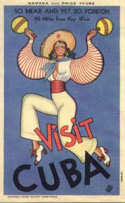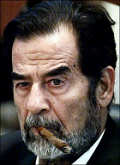 A while back we reported on a fine that OFAC imposed on the Alliance of Baptists, a church group which obtained a license for its member churches to travel in Cuba. Some of the member churches had apparently engaged in tourist activities such as visiting museums and other tourist attractions. Licenses for missionary activity in Cuba require that the missionaries devote their entire time in Cuba to a religious program and forbid groups from engaging in any tourist activities while in Cuba.
A while back we reported on a fine that OFAC imposed on the Alliance of Baptists, a church group which obtained a license for its member churches to travel in Cuba. Some of the member churches had apparently engaged in tourist activities such as visiting museums and other tourist attractions. Licenses for missionary activity in Cuba require that the missionaries devote their entire time in Cuba to a religious program and forbid groups from engaging in any tourist activities while in Cuba.
According to this article from Associated Baptist Press, OFAC withdrew the penalty on May 17, finding that none of the trips in question involved any improper tourist activities. This finding was allegedly premised on a submission that the group made to OFAC which can be found here. That submission, however, seems to be a fairly direct confession that the groups did, in fact, devote time to tourism, making OFAC’s actions here a bit hard to understand without assuming that the decision was based more on politics than policy.
The problem for the Alliance of Baptists started when it submitted to OFAC in June 2005 an itinerary for a March 2005 trip to Cuba. After analyzing that itinerary, OFAC suspended the Alliance’s travel license and stated the following in the Notice of License Suspension:
The itinerary included approximately four hours of religious activities each day, on average. The rest of the time was filled with walking and driving tours, sightseeing and beach time in Varadero, and visits to farms, museums and craft markets.
The Alliance response to OFAC’s subsequent decision to fine the Alliance $34,000 included a number of affidavits from people who were on the trips to Cuba using the Alliance license. In each instance, the affidavits admitted tourist activity occurred but tried to put a religious gloss on those activities.
An affidavit from a member of the Baptist Church of the Covenant in Birmingham, Alabama, admitted that its group took a driving tour of Havana, claiming to be to sick to engage in the religious activities that had been scheduled for the group. The affidavit of the pastor of the First Baptist Church of Washington, D.C., admitted that the group toured Old Havana but claimed that this was part of its “partnership” with a Cuban church. A member of another church admitted in his affidavit that his group, among other things, engaged in a nature hike in a national park, took a tour of the city of Santa Clara, attended the ceremonial closing of a harbor, and spent a morning touring Old Havana. These were all claimed to be religious activities because they were done together with members of Cuban churches.
Regular readers know that I think that OFAC has better things to do than to pore over the itineraries of Baptists in Cuba to make sure that they don’t have any fun while there. But, 31 C.F.R. 555.516 explicitly requires that licensed religious travelers be engaged “in a full-time program of religious activities” while in Cuba. Normal tourist activities can’t be turned into religious activities simply by enlisting a Cuban church member as a tour guide. Without some clarification from OFAC, it certainly looks like its about-face on its proposed penalty had little to do with the merits of the case.
 Last week the Office of Foreign Assets Control (“OFAC”) released its monthly summary of penalties imposed by the agency.
Last week the Office of Foreign Assets Control (“OFAC”) released its monthly summary of penalties imposed by the agency. 
 Posted by
Posted by  Category:
Category: 

 A while back we
A while back we  Michael Moore probably didn’t get a Christmas card from the Bushes this year — or any year for that matter. But he did recently get a
Michael Moore probably didn’t get a Christmas card from the Bushes this year — or any year for that matter. But he did recently get a  During an investigation of Col. William Steele for alleged improprieties in his oversight of the prison in Baghdad where high value detainees are kept, an
During an investigation of Col. William Steele for alleged improprieties in his oversight of the prison in Baghdad where high value detainees are kept, an  A short round-up of current export items that don’t merit their own posts:
A short round-up of current export items that don’t merit their own posts:

